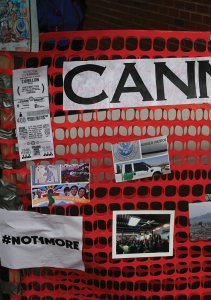
Two ASB trips collaborated on an ad-hoc border wall to raise awareness of immigration issues Friday in Red Square.
The Alternative Spring Break border awareness program aimed to generate discussion on immigration issues after two ASB groups returned from the 1,951-mile Mexican border over spring break by constructing an ad hoc border fence in Red Square Mar.ch 28.
The wood and plastic fence, manned by ASB members, was built primarily as a visual catalyst for a conversation on illegal immigrant deportation issues in the United States and was adorned with the sign “A House Divided Will Not Stand.”
“A key thing behind that [saying] was knowing our relationship with Mexicans and those who are trying to cross the border and migrants — and knowing that we’re really all together — and we look for ways to separate ourselves and think of ourselves as distinct, when in our history we are a nation of migrants,” ASB El Paso Trip Coordinator Phil Rogers (MSB ’14) said.
Rogers’ claims that the border fence’s presence strongly affects the cultural and economic links between border towns such as El Paso, TX and Ciudad Juarez in Mexico.
“[By building the fence in Red Square] we wanted to create a little annoyance for people so that they would engage with us and they would see how it kind of really tore apart border communities,” Rogers said. “Juarez and El Paso and other places are very much intertwined, and having that fence there has really impeded economic flow.”
Arizona ASB Trip Coordinator Kendra Layton (COL ’15) agreed.
“The border wall is not only a physical boundary, but emotional, spiritual and intellectual. It acts as a powerful symbol that divides communities, nations and people, rather than uniting them in their shared humanity,” Layton wrote in an email.
Trip coordinators hope that ASB attendees were left with a strong desire to encourage and participate in deportation advocacy.
“There’s a push to have post-trip activities, and ASB calls it ‘Bringing it Back Home.’ They look to not only have ASB be a one-week thing, but to make it a meaningful thing where you take what you’ve seen and learned and apply that to your life and bring that to other people as well,” Rogers said.
The ASB leaders who met with members of these migrant communities see the current national dialogue, which focuses on national security and protecting American jobs, as unrelated to the heart of the issue.
“The national dialogue is so irrelevant to what is actually going on, on the ground. The debate in Congress is ‘We won’t do anything until we secure our borders immediately,’” ASB El Paso Trip Coordinator Sophia Sepp (SFS ’14) said. “It’s already so militarized that El Paso is the safest city in the U.S. even though it borders Juarez, which was recently [recognized as] the murder capital of the world. So obviously there is a disconnect there.”
The ASB groups’ project ties into an upcoming march, “Two Million Too Many,” advocating a halt to deportations, which have reached their peak under the administration of President Barack Obama.
The April 5 march and rally, which begins in Lamont Park and culminates at Lafayette Park, is an attempt to pressure the U.S. government, as well as Obama, to overcome the stagnation of the immigration debate by addressing deportation with executive action.
“There are different executive actions that Obama can take that he doesn’t need Congress’ approval for that could remedy the situation,” Sepp said.
Another option is to stop the agreement between local law enforcement and Immigration Customs and Enforcement officials to identify and deport undocumented people.
The Georgetown University Immigration Coalition plans to play a role in the upcoming march as well and reaffirms the idea that stopping deportation is the first step, as announced in a press release.
Sepp hopes that addressing this highly politicized issue by experiencing it firsthand provided a valuable, fresh viewpoint.
“I think we try to really bring home the human dimension of it. We live in solidarity with the people down in El Paso and learn about their personal stories,” Sepp said.




















